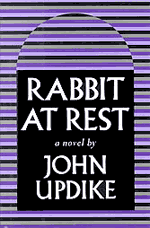
Whither Updike?
A few months back in The Sunday Times, the controversy-prone British journalist Rod Liddle wondered: “Has the reputation of any novelist fallen quite so far and so quickly as that of John Updike?” In answer to this question, Liddle compares Updike’s literary stock to that of fellow mid-century solipsists Philip Roth and Saul Bellow (though, interestingly, not Norman Mailer). The rest of the piece then swerves off into a discussion of sex in literature, arguing that Updike’s 1968 novel Couples “has a good claim to being the first mainstream up-market novel that really did sex, the first novel for the middle-class mass market to have given sex a good seeing to.” Now, I don’t see nothing wrong with a little literary bump and grind and, if I could make out what he is arguing, I might even agree with Liddle’s thesis. But to my mind, the question of Updike’s falling reputation is far more interesting.

F. Scott Fitzgerald said famously (and perhaps apocryphally) that writers seeking to secure their reputations should aim to please the housewives of today, the college professors of twenty years from now, and the high school students of the next century. As sardonically as this maxim may have been intended, it does a tidy job of slicing up the various categories of readers in this country: those who read for pleasure, those who read for a living, and those who read because they are forced to. And the formula certainly has worked for Fitzgerald. The Great Gatsby was a bestseller in its own day, placed second on the Modern Library’s 100 Best Novels of the Twentieth Century, and is one of the top ten most read books in American high schools. In the absence of a literary stock market (or any other solid measure of literary reputation) Fitzgerald’s formula is the best means of gauging a writer’s current and future reputation.
Updike has traditionally fared quite well among those proverbial housewives of today, the pleasure-reading first draft of reputation. His Rabbit series won two Pulitzer Prizes, sold hundreds of thousands of copies, and was a close runner up to Beloved in the New York Times’ recent survey, which asked 125 prominent writers and editors to name the best book of American fiction in the past twenty five years. Even recent clunkers such as The Widows of Eastwick scurry up bestseller lists like eager squirrels while garnering praise from book reviewers and readers alike. His short stories and book reviews appear in the New Yorker with shocking regularity and he has won almost every prize available to American writers. So where’s the reputation problem?
As those persnickety proverbial college professors begin looking back on the late twentieth century, Updike’s reputation has begun to suffer. Perhaps his patrician earnestness makes him an easy target. Perhaps he truly is overrated. In any case, Updike has been subject to some particularly brutal takedowns in the past fifteen or so years. In a 1996 piece in the Times Literary Supplement, Gore Vidal wrote that Updike’s work shows an “ignorance of history and politics and people unlike himself: in this he is a standard American and so typical of what (former) Vice-President Agnew once called the greatest nation in the country.” David Foster Wallace calls him “both chronicler and voice of probably the single most self-absorbed generation since Louis XIV.” And in his new book, How Fiction Works, fellow New Yorker critic James Woods takes Updike to task for his floppy prose, saying that his overwrought descriptions “freeze detail into a cult of itself.” But perhaps it is unfair to judge a writer on the basis of potentially jealous and otherwise-biased contemporaries.
How will Updike’s reputation fare in the future? No one can know what the high school English teachers of the future will enjoy reading. But it’s hard to imagine a world in which Rabbit Angstrom replaces Jay Gatsby as the Great American protagonist. Updike’s best chances probably lie in the upper-level literature seminars of the next century. Rabbit Angstrom could make a good example of mid 20th century white male suburban angst. Or perhaps Couples will be taught as an illustration of 1960s sexual mores. But when you consider that Updike’s novels will be elbowing for syllabus space with Toni Morrison, Vladimir Nabokov, Jack Kerouac, Saul Bellow, Phillip Roth, Michael Chabon, and Cormac McCarthy, it’s hard to see him faring very well.
